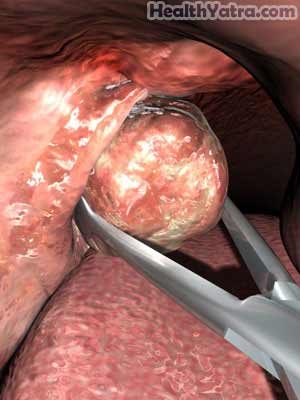تعريف
The tonsils are glands in the back of the throat. A tonsillectomy is the surgical removal of the tonsils.
أسباب هذا الإجراء
Tonsillectomy is most often done when other nonsurgical treatments have not worked for:
- Chronic or recurrent tonsil infections—Tonsillectomy may reduce the number, but will not completely eliminate, these infections.
- Peritonsillar abscess (pocket of infection spreading outside the tonsil)
- Enlarged tonsils causing obstruction of the throat

المضاعفات المحتملة
Complications are rare, but no procedure is completely free of risk. If you are planning to have a tonsillectomy, your سيقوم الطبيب بمراجعة القائمة من المضاعفات المحتملة، والتي قد تشمل:
- نزيف
- Temporary breathing problems
- رد فعل سلبي للتخدير
- Vomiting and dehydration
- العدوى
تشمل العوامل التي قد تزيد من خطر حدوث مضاعفات ما يلي:
- السمنة
- التدخين
- سوء التغذية
- Chronic illness
- فقر الدم المنجلي
- اضطرابات النزيف
- Recent or current steroid use
- مرض السكري
- Intake of anticoagulants or aspirin products
- تجفيف
Be sure to discuss these risks with your doctor before your tonsillectomy.
ما يمكن توقعه
قبل الإجراء
Your doctor may:
- Do a physical exam of the tonsils, throat, neck, and possibly other parts of the body
- Order blood tests and perhaps a urine test
- Review your medical history and current medicines
المؤدية إلى الإجراء الخاص بك:
- Talk to your doctor about your current medicines. Certain medicines may need to be stopped before the procedure such as:
- الأسبرين أو غيره من الأدوية المضادة للالتهابات لمدة تصل إلى أسبوع قبل الجراحة
- Blood-thinning drugs such as clopidogrel (Plavix) or warfarin (Coumadin)
- في الليلة السابقة، تناول وجبة خفيفة. لا تأكل أو تشرب أي شيء بعد منتصف الليل.
التخدير
General anesthesia is most commonly used. You will be asleep for the procedure. If necessary, the surgery can also be done with sedation and local anesthesia.
وصف الإجراء
The anesthesia will be given through an IV or by a mask. The doctor will grasp each tonsil with a special tool. The tonsils will then be cut away from the surrounding tissues and removed. The tonsils may be cut out with a scalpel or hot knife. An electrical current or clamps and ties will be used to stop bleeding at the site.

كم من الوقت سيستغرق ؟
About 20-60 minutes
هل سيكون هناك ألم؟
Anesthesia prevents pain during the procedure. After the procedure, you will find it difficult to swallow due to throat pain. You may also experience ear pain.
Your doctor will either give you pain medicine or recommend over-the-counter products to relieve pain.
متوسط الإقامة في المستشفى
This procedure is most often done in a hospital setting. It may be possible to leave the hospital on the day of the procedure. Some patients may need to stay in the hospital for up to two days. Talk to your doctor about what is right for you.
رعاية ما بعد العملية
في المستشفى
- You will be monitored for any negative reactions to anesthesia or other complications.
- Once you are fully awake, alert, and stable, you may be able to leave. An adult should accompany you and drive you home.
في البيت
عندما انت العودة إلى المنزل, take the following steps to help ensure a smooth recovery:
- تأكد من اتباع تعليمات طبيبك.
- Take medicines that are prescribed as directed.
- Avoid talking, coughing, and singing for one week.
- شرب الكثير من السوائل.
- Avoid spicy, acidic, and hard-to-digest foods.
- Eat soft foods, such as gelatin and pudding, for 3-4 days after surgery. Gradually return to a normal diet.
- Avoid swallowing hard items such as crackers and hard cookies. They may injure the back of your throat.
- Bathe or shower as usual.
استدعاء الطبيب
بعد مغادرة المستشفى، اتصل بطبيبك إذا حدث أي مما يلي:
- علامات الإصابة, بما في ذلك حمى وقشعريرة
- Redness, swelling, increasing pain, excessive bleeding, or discharge from the site where the tonsils were removed
- الغثيان و / أو القيء الذي لا يمكنك السيطرة عليه بالأدوية التي أعطيت لك بعد الجراحة ، أو التي تستمر لأكثر من يومين بعد الخروج من المستشفى
- Pain that you cannot control with the medicines you have been given, especially if it prevents you from drinking water
- السعال، ضيق التنفس، أو ألم في الصدر
- Spitting or vomiting blood
- أعراض جديدة غير مبررة
في حالة الطوارئ ، اتصل على المساعدة الطبية على الفور.
